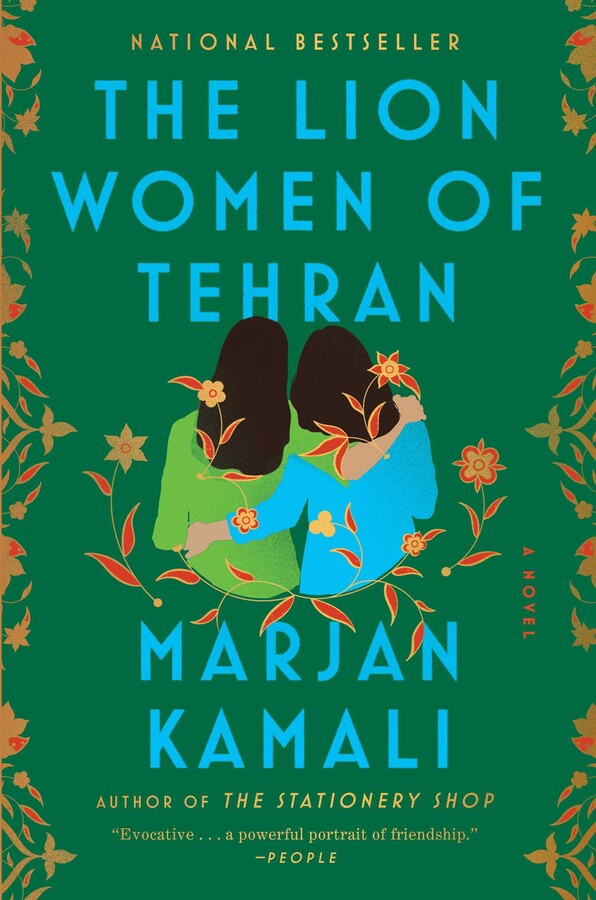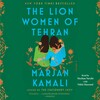Plus, receive recommendations and exclusive offers on all of your favorite books and authors from Simon & Schuster.
The Lion Women of Tehran
LIST PRICE $14.99
Digital products purchased on SimonandSchuster.com must be read on the Simon & Schuster Books app. Learn more.
Get 30% off hardcovers with code MOM30, plus free shipping on orders of $40 or more. Terms apply.
Buy from Other Retailers
Table of Contents
About The Book
An “evocative read and a powerful portrait of friendship, feminism, and political activism” (People) set against three transformative decades in Tehran, Iran—from nationally bestselling author Marjan Kamali.
In 1950s Tehran, seven-year-old Ellie lives in grand comfort until the untimely death of her father, forcing Ellie and her mother to move to a tiny home downtown. Lonely and bearing the brunt of her mother’s endless grievances, Ellie dreams for a friend to alleviate her isolation.
Luckily, on the first day of school, she meets Homa, a kind girl with a brave and irrepressible spirit. Together, the two girls play games, learn to cook in the stone kitchen of Homa’s warm home, wander through the colorful stalls of the Grand Bazaar, and share their ambitions of becoming “lion women.”
But their happiness is disrupted when Ellie and her mother are afforded the opportunity to return to their previous bourgeois life. Now a popular student at the best girls’ high school in Iran, Ellie’s memories of Homa begin to fade. Years later, however, her sudden reappearance in Ellie’s privileged world alters the course of both of their lives.
Together, the two young women come of age and pursue their own goals for meaningful futures. But as the political turmoil in Iran builds to a breaking point, one earth-shattering betrayal will have enormous consequences.
“Reminiscent of The Kite Runner and My Brilliant Friend, The Lion Women of Tehran is a mesmerizing tale” (BookPage) of love and courage, and a sweeping exploration of how profoundly we are shaped by those we meet when we are young.
Appearances
Reading Group Guide
Get a FREE ebook by joining our mailing list today! Plus, receive recommendations for your next Book Club read.
In 1950s Tehran, seven-year-old Ellie lives in grand comfort until the untimely death of her father, forcing Ellie and her mother to move to a tiny home downtown, far removed from their privileged past. Lonely and bearing the brunt of her mother’s endless grievances, Ellie dreams of a friend to alleviate her isolation.
Luckily, on the first day of school, she meets Homa, a kind, passionate girl with a brave and irrepressible spirit. Together, the two girls play games, learn to cook in the stone kitchen of Homa’s warm home, wander through the colorful stalls of the Grand Bazaar, and share their ambitions for becoming “lion women.”
But their happiness is disrupted when Ellie and her mother are afforded the opportunity to return to their previous bourgeois life. Now a popular student at the best girls’ high school in Iran, Ellie’s memories of Homa begin to fade. Until Homa reappears in Ellie’s privileged world unexpectantly, years later, altering the course of both of their lives.
Together, the two young women come of age and pursue their own goals for meaningful futures. But as the political turmoil in Iran builds to a breaking point, one earth-shattering betrayal will have enormous consequences.
Topics and Questions for Discussion
1. The book opens from Ellie’s point of view in 1980s New York City. What are some observations she has about the city? What does this tell you about how she sees herself there? Discuss how she describes New York in the first chapter and in Part Five compared to how she describes Tehran. What are the differences?
2. How would you describe the city of Tehran during Ellie and Homa’s childhoods? What feelings does it invoke? How was Tehran different for both girls before they lived in the same neighborhood?
3. Ellie’s mother has an obsession with the evil eye. Where do you believe this originates? What effect do you think this has on Ellie’s mother’s outlook on life, and how might it affect Ellie as she grows up?
4. Ellie spends much of her childhood mourning her father’s death. How does her image of him compare to the man Ellie’s mother reveals him to be later in the book? How does Ellie’s relationship with her mother change once she finds out? How does this help explain Ellie’s mother’s actions throughout the book?
5. How would you describe how Ellie’s mother thinks of Homa? Why do you think she feels this way? How does this foreshadow what happens later in the book?
6. Seven years pass between Part One and Part Two, and we find Ellie at an upscale school in a nice neighborhood with a new group of friends. How has her life changed, and how have her relationships changed, or stayed the same?
7. Describe the role politics in Iran plays throughout the book. How does it propel the plot forward? Does is function as a main character? How do the characters interact with politics, and how does it shape their futures?
8. Two themes of the book are betrayal and jealousy. How was this explored throughout the book (i.e. between characters, through the setting, between social classes, in politics, etc.)? Were there instances of betrayal that surprised you?
9. Homa’s experience in prison devastated her plans and set her on a new trajectory for the rest of her life. What might have happened if she was not imprisoned and raped? How might her life have turned out differently? Would Homa and Ellie have remained friends?
10. Part Four opens from Homa’s point of view. How are her and Ellie’s voices different? Discuss how the author uses shifting points of view as a plot device and what it adds to the narrative.
11. Homa talks about growing up to be “lion women” throughout the book. How would you describe “lion women,” and how do Homa and Ellie understand the idea? How might it apply to women in general?
12. Discuss the romantic relationships throughout the book. Mehrdad and Ellie, Homa and Abdol, Ellie’s mother and Ellie’s baba, Ellie’s mother and Uncle Massoud, Sousan and the Colonel, and so on. How do these relationships demonstrate gender and societal norms in Iran from the 1950s to the 1980s? Do any of them subvert traditional gender roles? How?
13. The author explores the bonds between mother and daughter throughout the book. Discuss the mother-daughter relationships for each character and what they have in common.
14. In the final chapter and epilogue, we fast forward to 2022 and find out that Homa remained in Iran to fight for women’s freedoms, and Ellie followed her dream of opening an Iranian cafe in America. How do these two women embody what it means to be Lion Women? How do they reflect on their pasts, and what do you think their hopes are for their futures?
Enhance Your Book Club
1. Before the Islamic Revolution, women in Iran enjoyed many liberal freedoms that Western women are familiar with. What did you know about Iran before reading this book, and how have these characters and their stories changed your understanding? Now, Mahsa Amini has inspired another generation of Iranian women to protest and fight against oppression. What role do women play in political movements around the world? How much has changed since Ellie and Homa’s childhoods in Iran, and what has remained the same?
2. This book is propelled by relationships between women. Describe those relationships and compare them to each other. Do you see relationships like these in your own life? What makes relationships between women special?
Product Details
- Publisher: Gallery Books (July 2, 2024)
- Length: 336 pages
- ISBN13: 9781668036600
Raves and Reviews
"Elegant...A tender, beautifully written examination of two women—and their choices—over more than 30 years." —Oprah Daily
“Kamali writes beautifully and passionately about friendship, love, youth, conflict, aging and the challenges of sustaining meaningful relationships amid high-stakes Iranian politics. The novel is full of atmosphere, history, great food and two unforgettable heroines...[who] will endear and intrigue readers from the opening scenes to the last page – a must-read.” —NPR
“Riveting...Reminiscent of The Kite Runner and My Brilliant Friend, The Lion Women of Tehran is a mesmerizing tale featuring endearing characters who will linger in readers’ hearts.” —BookPage
“Kamali tells a moving story of an unforgiving time, an unlikely friendship, and how a country’s transformation, in turn, transforms the lives of two unforgettable women. Simultaneously heartbreaking and life affirming, it’s a book that you won’t be able to put down until you’ve read every word.” —Adrienne Brodeur, New York Times bestselling author of Little Monsters
"With this masterful, heart-centered novel, Marjan Kamali has crafted a deeply honest look at the true meaning of friendship. Through Homa and Ellie we see the nuances of a perfectly imperfect love that withstands class differences, personal trauma, jealousy, war, and revolution. Their souls are forever intertwined and as a reader it is an honor to bear witness. This book made me incredibly proud to be an Iranian woman—a Lion Woman too." —Shideh Etaat, author of Rana Joon and the One and Only Now
"Marjan Kamali is at it again, this time bringing us a story of friendship and love set against the tumult and terror of the Iranian Revolution. The Lion Women of Tehran is a novel about two girls, who grow up wanting very different things but are united by their affection for each other and their shared desire for a more egalitarian Iran. Kamali is a gifted storyteller at the height of her powers, who manages to connect the country’s complicated history with its present and sing the praises of Iranian women who, even today, are fighting for the most basic of freedoms. If you liked The Stationery Shop, you’ll love The Lion Women of Tehran." —Rachel Beanland, author of Florence Adler Swims Forever and The House is On Fire
"In The Lion Women of Tehran, Marjan Kamali brings to life the beauty and tragedy of Iran in the 1960s. From the delicious scent of spices simmering, to the colors of the bazaar, to the snowflakes landing on a certain character’s hair, this story came brilliantly alive to me from the very first page. Courage, friendship, loyalty, hardship, love—this novel has everything." —Mary Beth Keane, New York Times bestselling author of Ask Again, Yes
"Kamali's storytelling is both evocative and hauntingly beautiful, creating a vivid portrayal of the characters' lives and the cultural tapestry of Tehran. The Lion Women of Tehran is not merely a novel; it is a sweeping exploration of the enduring influence of early connections, the resilience of the human spirit, and the transformative power of love and courage in the face of political upheaval. This novel is a testament to Kamali's storytelling prowess and her ability to create a deeply moving and thought-provoking narrative. I loved this book!" —Jean Kwok, New York Times bestselling author of Searching for Sylvie Lee
"A moving tale of friendship, betrayal, and forgiveness, unfolding into a deep and powerful exploration of feminist protest in Iran. The contrast between Ellie and Homa’s voices is a narrative all of its own, and Homa deserves a place as one of the true heroines of literature.” —Erica Bauermeister, New York Times bestselling author of No Two Persons
"An evocative read and a powerful portrait of friendship, feminism, and political activism." —People
"More than a tale of friendship or a coming-of-age story, it’s a beautifully crafted and subtle exploration of love, family, friendship, ambition, betrayal and redemption in a socio-political powder keg...This finely written novel emphasizes the human experience in the face of turmoil.” —Bookreporter
Resources and Downloads
High Resolution Images
- Book Cover Image (jpg): The Lion Women of Tehran eBook 9781668036600
- Author Photo (jpg): Marjan Kamali Photograph by David E. Lawrence(0.1 MB)
Any use of an author photo must include its respective photo credit














